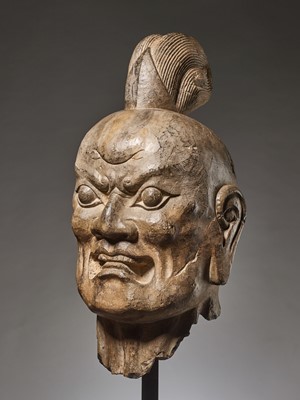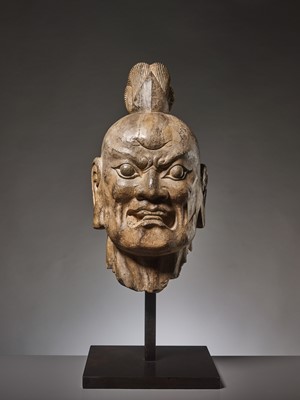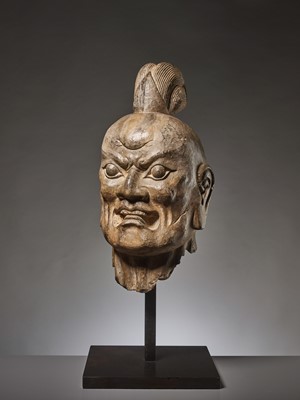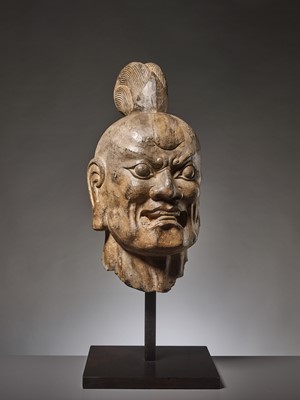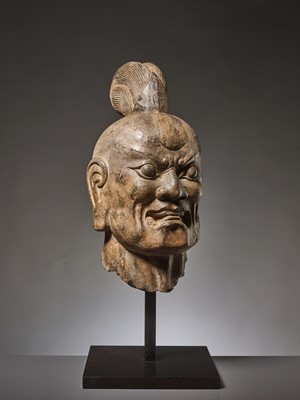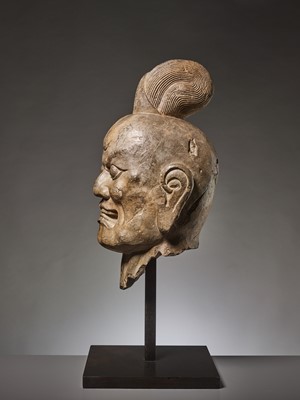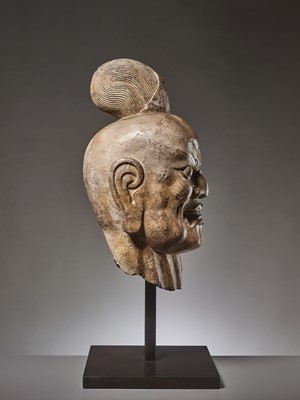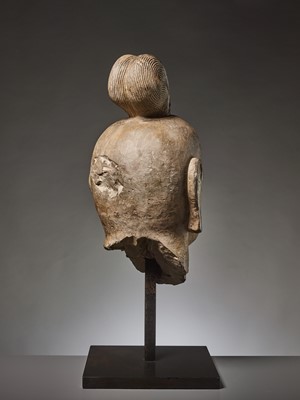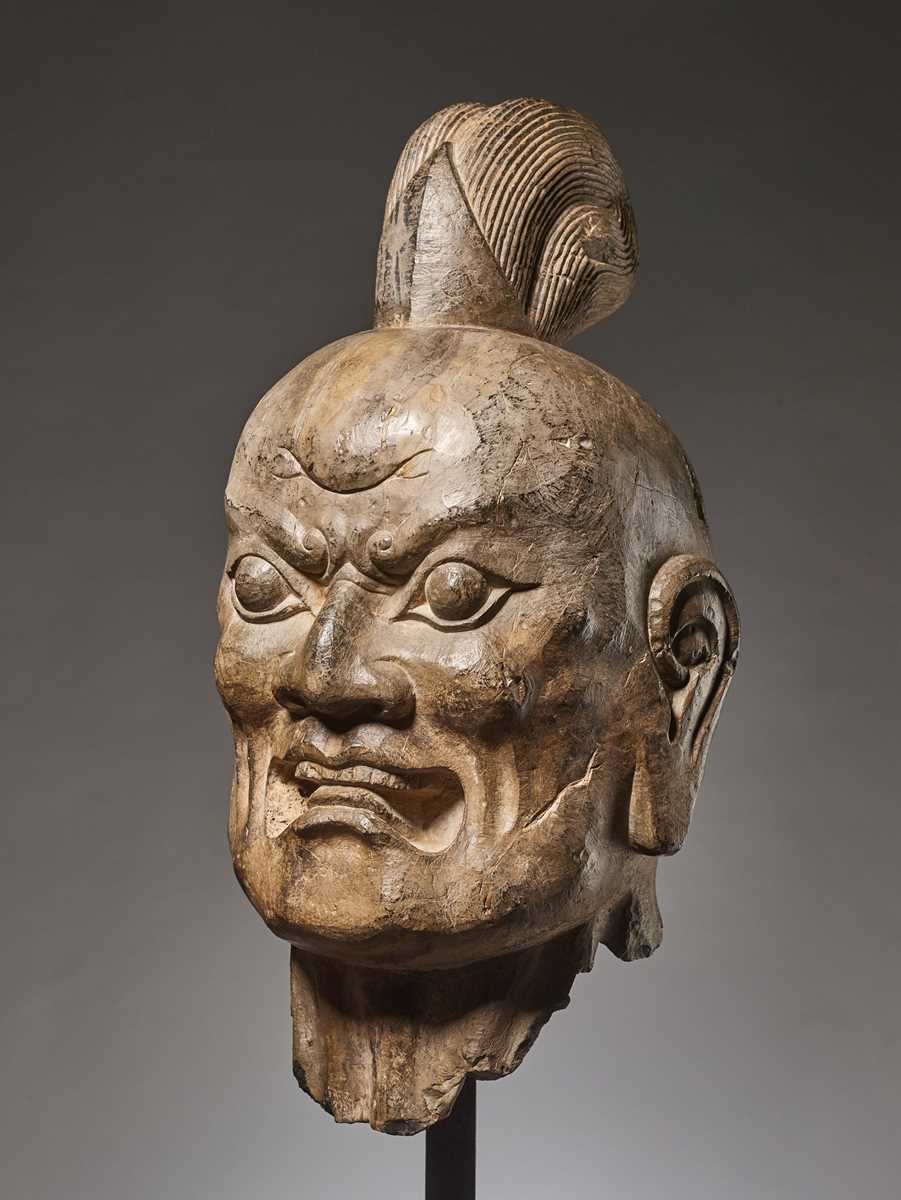1st Jan, 2020 10:00
Auction Highlights Pre 2020
55
OVER-LIFESIZE LIMESTONE HEAD OF A TIANWANG GUARDIAN GOD, CHINA, TANG DYNASTY
Sold for €169,000
including Buyer's Premium
Sculpted and carved massive limestone with a rich and even age patina. The extremely heavy head is mounted on an elegant metal base.
This head, very unusual in the power of its expression, is that of a Tianwang. These are the temple guardians who were originally demon kings that converted to Buddhism and were made guardians of holy sites. As this head alone makes impressively clear, their appearance is powerful and extremely athletic. The precise depiction of the facial expression in its complete concentration on the greatest possible vigilance is of great artistic quality and has been reproduced with a rare degree of intensity. These Tianwang, literally “heavenly kings” are a quartet referred to as the Sida Tianwang 四 大 天 王 – the “Four Great Heavenly Kings” – as well as the “Diamond Kings”, the Jingang, 金 剛, literally “precious and hard”. This means that while they themselves can wound others, they cannot be wounded. The Tianwang have bodies and faith “as strong as steel”, something which this head makes convincingly clear. Because it lacks attributes it cannot be identified by name. While they are less directly honored – compared to the Buddha, the bodhisattvas etc. – they are still elementary figures, portrayed in Chinese mythology as guardians located on the four corners of Mount Meru, the center of the cosmos, where all four have their palaces. This head has a tall shock of hair which emerges like a waterfall and is held together by a prominent piece resembling a sharp blade. The interplay of the expressive shapes of the almost screaming, open mouth, the dynamic arched eyebrows (with small volutes in the region around the nose’s bridge), the suspiciously raised forehead wrinkles and this “blade” is dramatically executed.
Shape: Sculptural
Dimensions: Height 56 cm (without base).
Condition: While certain signs of its old age are, of course, present, this head’s very complete preservation is impressive. One major dent to the backside. Minor chipping here and there, wear, some hardly visible surface scratches.
Provenance: This sculpture has been in the collection of a French noble family since at least 1967 and is documented in the collection’s records with a hand-drawn study (see illustration). The collection’s original roots go back to Évariste Regis Huc (1813 – 1860), a French missionary and discoverer who became widely famous for his travels through Mongolia, Tibet and China. Reaching Lhasa in 1846, he was probably also the first European to do so. Huc laid the foundations to the collection in question, which was systematically inventoried and documented in 1967.
Literature comparison: Comparable examples can be found in “Complete Works of Statues in Longmen Grottoes”, Beijing 2002, ill. 28 to 30; in “Ancient Chinese Buddhist Sculptures”, Taipei 1989, no. 9; or in “Chinese Buddhist Stone Sculptures – Veneration of the Sublime”, Osaka 1995, no. 59. Sothebys, Contemporary Literati: Curiosity, 05 APR 2015, HONG KONG, lot 2843. (for another, yet smaller RARE LIMESTONE HEAD OF A GUARDIAN, TANG DYNASTY)
唐代石灰石天王頭像
雕刻精細,巨大的石灰石,歲月的包漿,極重的頭像被固定在金屬底座上
中國,唐代(618-907)
頭像呈現了天王與眾不凡的力量。天王是净土佛寺的護法天神。他們曾是魔界天王,受佛教指引成爲守護衆生的天王,外表强大,極具競技力。藝術欣賞價值極高。四大天王是護膚天王,被稱爲四大金剛。金剛字面意義“珍貴而艱苦”。天王的身體和信仰像鋼一樣堅强。雖然,他們不如佛陀和菩薩般重要,他們是小人物,是神話中的守護神,守護在宇宙的中心——美廬山的四角。這個頭像面部表情極其生動形象,頭髮極具衝擊力,如瀑布一樣,并髮箍固定在頭部,齜牙咧嘴,眼睛圓瞪,眉毛拱起,額頭皺紋深刻。
形狀:雕塑
尺寸:高56厘米(不包含底座)
石灰石雖然有老化跡象,但是保存非常完整。背面有一大凹痕。幕布有輕微磨損,表面有一些細微的劃痕。
這件雕塑自1967年至今一直在法國一個貴族家族中收藏,在藏品記錄中有手繪研究記錄。這個收藏可追溯的法國傳教士古察伯(1813-1860),他的游記《韃靼西藏旅行記》聞名遐邇。1846年到達拉薩,也許是第一個這麽做的歐洲人。古察伯為該家族收藏奠定了基礎,收藏在1967年被系統的盤點並記錄。
文獻比較:相似例子可見《龍門石窟藝術 增訂本》,北京2002年,28-30頁。Ancient Chinese Buddhist Sculptures,臺北1989年第9號;Chinese Buddhist Stone Sculptures – Veneration of the Sublime 大阪1995年,第59號。蘇富比Contemporary Literati: Curiosity,2015年4月5日,香港,2843號(另外一個唐代更小的石灰石天王)
Sculpted and carved massive limestone with a rich and even age patina. The extremely heavy head is mounted on an elegant metal base.
This head, very unusual in the power of its expression, is that of a Tianwang. These are the temple guardians who were originally demon kings that converted to Buddhism and were made guardians of holy sites. As this head alone makes impressively clear, their appearance is powerful and extremely athletic. The precise depiction of the facial expression in its complete concentration on the greatest possible vigilance is of great artistic quality and has been reproduced with a rare degree of intensity. These Tianwang, literally “heavenly kings” are a quartet referred to as the Sida Tianwang 四 大 天 王 – the “Four Great Heavenly Kings” – as well as the “Diamond Kings”, the Jingang, 金 剛, literally “precious and hard”. This means that while they themselves can wound others, they cannot be wounded. The Tianwang have bodies and faith “as strong as steel”, something which this head makes convincingly clear. Because it lacks attributes it cannot be identified by name. While they are less directly honored – compared to the Buddha, the bodhisattvas etc. – they are still elementary figures, portrayed in Chinese mythology as guardians located on the four corners of Mount Meru, the center of the cosmos, where all four have their palaces. This head has a tall shock of hair which emerges like a waterfall and is held together by a prominent piece resembling a sharp blade. The interplay of the expressive shapes of the almost screaming, open mouth, the dynamic arched eyebrows (with small volutes in the region around the nose’s bridge), the suspiciously raised forehead wrinkles and this “blade” is dramatically executed.
Shape: Sculptural
Dimensions: Height 56 cm (without base).
Condition: While certain signs of its old age are, of course, present, this head’s very complete preservation is impressive. One major dent to the backside. Minor chipping here and there, wear, some hardly visible surface scratches.
Provenance: This sculpture has been in the collection of a French noble family since at least 1967 and is documented in the collection’s records with a hand-drawn study (see illustration). The collection’s original roots go back to Évariste Regis Huc (1813 – 1860), a French missionary and discoverer who became widely famous for his travels through Mongolia, Tibet and China. Reaching Lhasa in 1846, he was probably also the first European to do so. Huc laid the foundations to the collection in question, which was systematically inventoried and documented in 1967.
Literature comparison: Comparable examples can be found in “Complete Works of Statues in Longmen Grottoes”, Beijing 2002, ill. 28 to 30; in “Ancient Chinese Buddhist Sculptures”, Taipei 1989, no. 9; or in “Chinese Buddhist Stone Sculptures – Veneration of the Sublime”, Osaka 1995, no. 59. Sothebys, Contemporary Literati: Curiosity, 05 APR 2015, HONG KONG, lot 2843. (for another, yet smaller RARE LIMESTONE HEAD OF A GUARDIAN, TANG DYNASTY)
唐代石灰石天王頭像
雕刻精細,巨大的石灰石,歲月的包漿,極重的頭像被固定在金屬底座上
中國,唐代(618-907)
頭像呈現了天王與眾不凡的力量。天王是净土佛寺的護法天神。他們曾是魔界天王,受佛教指引成爲守護衆生的天王,外表强大,極具競技力。藝術欣賞價值極高。四大天王是護膚天王,被稱爲四大金剛。金剛字面意義“珍貴而艱苦”。天王的身體和信仰像鋼一樣堅强。雖然,他們不如佛陀和菩薩般重要,他們是小人物,是神話中的守護神,守護在宇宙的中心——美廬山的四角。這個頭像面部表情極其生動形象,頭髮極具衝擊力,如瀑布一樣,并髮箍固定在頭部,齜牙咧嘴,眼睛圓瞪,眉毛拱起,額頭皺紋深刻。
形狀:雕塑
尺寸:高56厘米(不包含底座)
石灰石雖然有老化跡象,但是保存非常完整。背面有一大凹痕。幕布有輕微磨損,表面有一些細微的劃痕。
這件雕塑自1967年至今一直在法國一個貴族家族中收藏,在藏品記錄中有手繪研究記錄。這個收藏可追溯的法國傳教士古察伯(1813-1860),他的游記《韃靼西藏旅行記》聞名遐邇。1846年到達拉薩,也許是第一個這麽做的歐洲人。古察伯為該家族收藏奠定了基礎,收藏在1967年被系統的盤點並記錄。
文獻比較:相似例子可見《龍門石窟藝術 增訂本》,北京2002年,28-30頁。Ancient Chinese Buddhist Sculptures,臺北1989年第9號;Chinese Buddhist Stone Sculptures – Veneration of the Sublime 大阪1995年,第59號。蘇富比Contemporary Literati: Curiosity,2015年4月5日,香港,2843號(另外一個唐代更小的石灰石天王)
Interested in buying one of these pieces?
Please contact us at office@zacke.at or +43 (1) 532 04 52. Prices already include Buyer's Premium. The price you see here is the final price you will end up paying.
